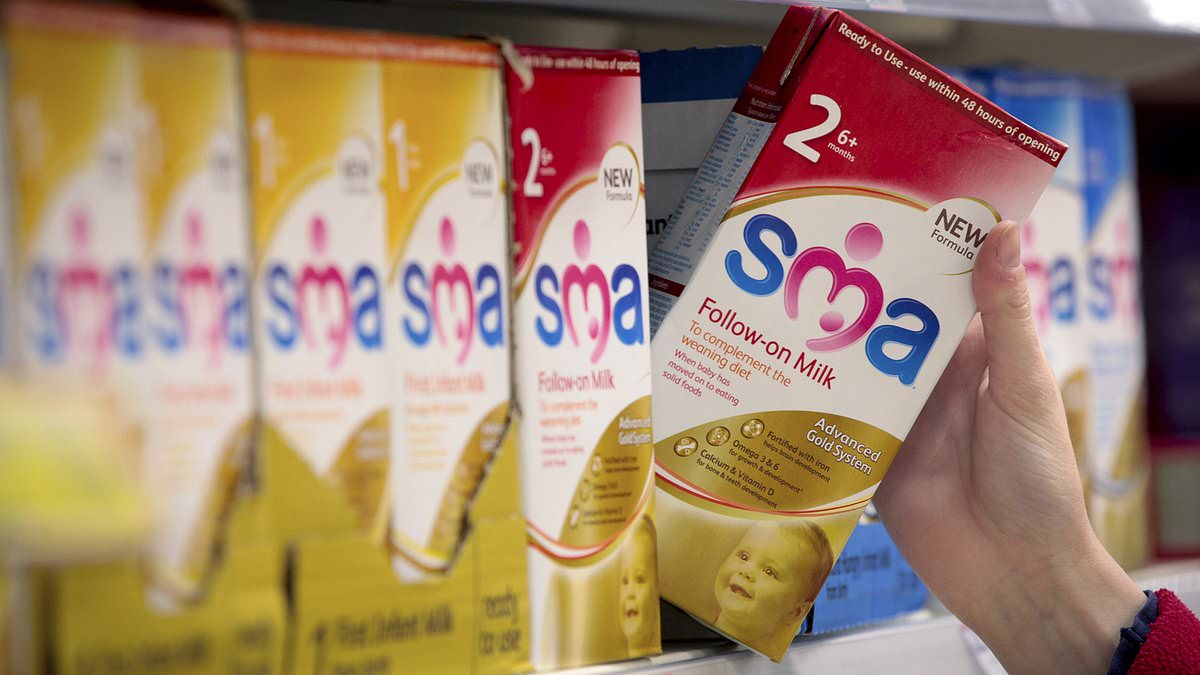Baby milk should come in plain packaging to reduce the UKs ‘formula culture’ and boost children’s health, experts say.
Chris Van Tulleken said officials need to be ‘focusing guns on baby food and formula’, which he says are fuelling unhealthy habits from birth.
The author and campaigner said parents are being exploited by an ‘oligopoly’ of formula producers, with more than half of substitute milks produced by just four companies.
These ‘psychologically’ target parents using ‘sophisticated marketing techniques’ to exploit regulatory loopholes and exaggerate health benefit claims, he said.
The Goodwood Health Summit on microbiome, infant feeding & the first five years, heard how marketing strategies prey on parents’ fears and concerns at a vulnerable time.
The rise in formula has transformed feeding babies into a million-pound business, ‘shaped by profit’ rather than public health, the panel said.
Dr Van Tulleken said the focus should not be on parents but tighter regulation on the industry – such as plain packaging and the introduction of price caps on breastmilk substitutes.
Only then can the country boost its poor breastfeeding rates, which are among the lowest in the world.
Giving the example of ‘follow-on milk’, he explained how advertising formula for babies under six months is prohibited in the UK to protect breastfeeding.
But these restrictions do not extend to products aimed at babies over six months.
As such, manufacturers can promote their brand through these products while ‘explicitly implying’ they have milk substitutes for newborns.
He said: ‘We need to be really focusing our guns on baby food and formula and looking at quite severe regulatory restrictions.’
‘The industry uses follow-on milks to market baby milk. You can’t market baby formula but you can market follow-on milk – even though it’s just milkshake for kids.
‘They’re all in the same packaging and come with the idea there are different “stages” of milk.
‘Baby milk is stage one, so logically there comes a time when you have stages two, three and four, even though these are just sugar-sweetened beverages.
‘These are very sophisticated marketing approaches and there is no way this shouldn’t be sewn up by stricter regulations.’
The calls echo those from the World Health Organization (WHO), which wants governments to enact laws to end the promotion of formula milk products, including plain packaging.
Its International Code of Marketing of Breastmilk Substitutes – known more widely as ‘the Code’ – is a policy framework to regulate the marketing of breastmilk substitutes in order to protect breastfeeding.
It encourages Governments to legislate to prevent commercial interests from damaging breastfeeding rates and the health of their population.
But UK regulations only cover infant formula intended for babies under six months old, allowing for widespread advertising on television and elsewhere.
Research shows breastfed children have a boosted immune system, less chance of growing up overweight, developing several cancers and a lower risk of developing asthma and allergies.
Yet, rates of exclusive breastfeeding start at 81 per cent at birth but fall to 24 per cent at six weeks, and 17 per cent at three months, according to Unicef.
Professor Louise Kenny, of the Faculty of Health and Life Sciences at the University of Liverpool, said women need to be given more support and shielded from aggressive marketing, which can start in hospital.
She admitted ‘breastfeeding is the hardest thing I’ve ever done’ and that companies exploit this and the insecurities of new parents when they were vulnerable.
She said: ‘Breastfeeding is still not the norm in our society and that’s tragic.
‘It’s tricky as some women do need formula but I think it should come like cigarettes – unbranded – to encourage breastfeeding.
‘Many of the claims these companies make are completely unsubstantiated but parents are compelled to do the absolute best for kids.’
The Professor of Obstetrics and Gynaecology described how there was ‘intergenerational brand loyalty’ to formula milk in Liverpool, showing the effects of marketing.
She added: ‘I think we should consider a range of initiatives such as a plain packaging and a price-cap.
‘If you remove the profit, you remove the market and the companies from marketing these unhealthy behaviours.’
It comes weeks after research showed one in three toddlers are drinking processed milk that is too high in sugar, putting them at risk of obesity and tooth decay.
The First Steps Nutrition charity found ‘growing-up’ or ‘toddler’ formula milks for children aged one to two can contain more calories from sugar than an adult chocolate milkshake.
Findings from an investigation by the Competition and Markets Authority (CMA) is expected later this month after a report last year found prices had soared by 25 per cent in two years.
A Department of Health and Social Care spokesperson said: ‘No parent should be ripped off and the Competition and Markets Authority is investigating the rising cost and marketing of infant and follow-on formula.
‘The UK has robust regulations on the ingredients, marketing and labelling of infant and follow-on formula which ensures labels are accurate and not misleading. But we will carefully consider the recommendations from the CMA once its review has completed.’
